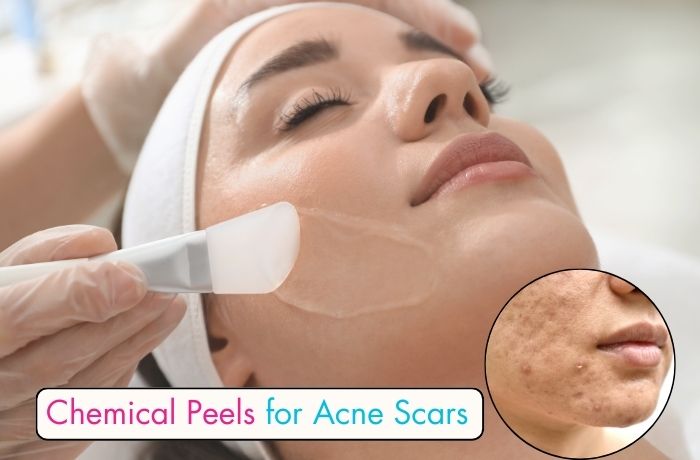Acne scars can be a frustrating reminder of past breakouts, affecting your skin’s appearance and confidence. While there are many treatments available to reduce these scars, chemical peels are one of the most effective ways to improve skin texture and reduce scarring. In this blog, we’ll look at the benefits, types and processes of chemical peels for acne scars.
1. What Are Chemical Peels for Acne Scars?
A chemical peel is a cosmetic treatment that uses a chemical solution to exfoliate the skin. It removes the outermost layers of skin to reveal new, smoother skin underneath. This process helps to reduce the appearance of acne scars by encouraging new cell growth and collagen production. Chemical peels can improve the overall texture and tone of your skin.
2. How Do Chemical Peels Work on Acne Scars?
Chemical peels work by applying a specially formulated chemical solution to the skin. This solution causes the top layers of skin to peel away, and over time new skin replaces the old.
For acne scars, peels work in two main ways:
-Exfoliation: It removes dead skin cells to make way for new, healthy cells.
-Boosting collagen: By penetrating the skin, chemical peels stimulate the production of collagen, which is essential for healing and smoothing acne scars.
3. Benefits of Chemical Peels for Acne Scars
Chemical peels offer several benefits, especially if you have acne scars:
- Smoother skin texture: By removing the damaged outer layers, chemical peels make your skin feel smoother.
- Reduced scarring: Over time, regular chemical peels can significantly reduce the appearance of acne scars.
- Even skin tone: They can lighten dark spots and pigmentation caused by acne.
- Increased collagen: Collagen production is the key to plump, healthy skin that reduces fine lines and scars.
4. Types of Chemical Peels for Acne Scars
There are three main types of chemical peel, each suitable for different levels of acne scarring:
A. Superficial peels
These are the mildest form of chemical peels and are great for treating light acne scars and discoloration.
They require minimal downtime and are suitable for all skin types.
B. Medium peels
Medium peels penetrate deeper into the skin layers and are used to treat moderate acne scars.
They usually require more recovery time (about a week) and are more effective than superficial peels.
C. Deep peels
Deep peels are the most powerful and are used for more severe acne scars.
They require a longer recovery time and should only be done under the supervision of a dermatologist due to the intensity of the peel.
5. Who should have a chemical peel?
Not everyone is an ideal candidate for a chemical peel. Here are a few things to consider:
- Skin type: People with fair skin and fair hair tend to see the best results, although people with darker skin can also benefit from certain types of peels.
- Skin condition: If you have active acne, very sensitive skin or certain skin conditions, your dermatologist may recommend waiting before having a peel.
- Consultation: It’s important to consult a dermatologist who can assess your skin and determine the best type of peel for your acne scars.
6. Chemical Peel Treatment Process
The process of a chemical peel is simple but effective:
-Consultation: Your dermatologist will analyze your skin and recommend the appropriate type of peel.
-Preparation: The skin is cleansed and the chemical solution is applied evenly over the treatment area.
-Application: The solution is left on for a specific time, depending on the type of peel.
-Post-treatment care: After the treatment, your skin will peel over the next few days. It’s important to follow the post-treatment regimen, which includes avoiding sun exposure, keeping your skin moisturized and using recommended products to aid healing.
7. How Many Chemical Peel Sessions Are Needed for Best Results?
The number of sessions you need will depend on the severity of your acne scars and the type of peel used:
- Superficial peels: These require more frequent treatments (every few weeks) for optimal results.
- Deep peels: Usually 3-4 treatments at intervals of several months can produce noticeable improvements.
- Deep peels: These are often a single treatment, but the results are long lasting.
Consistency is key to achieving the best results, so be sure to follow your dermatologist’s treatment plan.
Consult Dr. Priyanka Tambe for Chemical Peeling Treatment in Kharadi
If you’re looking for a professional dermatologist to guide you through a chemical peel treatment, consult Dr. Priyanka Tambe at Skinfinity Aesthetics in Kharadi. With years of experience in skincare and acne scar treatment, Dr Tambe can offer personalized chemical peel treatments to help rejuvenate your skin and reduce scarring. Skinfinity Aesthetics offers a range of advanced skincare treatments tailored to your skin type and condition.
For more information or to book an appointment, visit Skinfinity Aesthetics in Kharadi today!
Chemical peels can be an effective treatment for reducing acne scars, smoothing your skin and boosting your confidence. Whether you’re dealing with mild or severe scarring, there’s a peel that can work for you. However, it’s important to consult a dermatologist to make sure the treatment is tailored to your skin’s needs.
